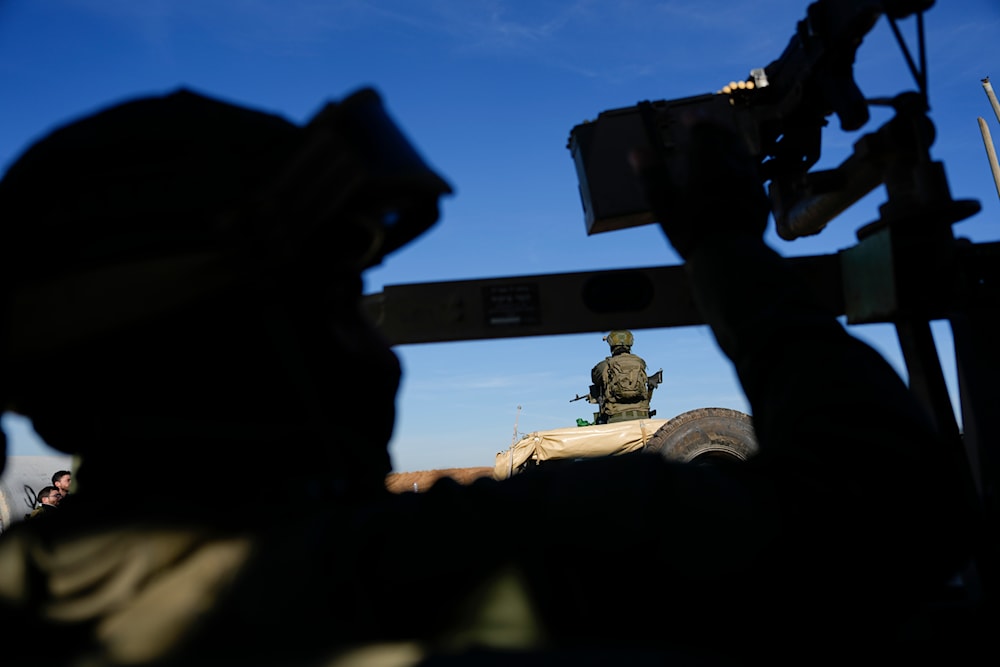Iran attack on 'Israel' reveals it cannot engage in multi-front war
Israeli media underlines that the occupation's weaknesses are being exposed, warning that it should not engage in a multi-front war.
-

Israeli occupation soldiers during the invasion of Gaza, occupied Palestine, February 8, 2024 (AP)
In the wake of heightened tensions between the Israeli occupation and Iran, Israeli media outlets have scrutinized the implications of Iran's response to the Israeli attack on the Iranian consulate in Damascus, Syria. Additionally, there is a growing discourse on the occupation's capacity to engage in multiple fronts simultaneously.
Former Israeli land force commander and reserve general, Guy Tzur, cautioned against the strategy of opening additional battlefronts, labeling it a "big mistake."
Tzur, speaking on the Israeli Kan TV, highlighted the many setbacks historically faced by the Israeli occupation during such endeavors, stressing that the outcome would be "very bad".
Echoing similar sentiments, "Tel Aviv" University professor Israel Sporta advocated for a reassessment of the occupation forces' military strategy, questioning the notion of the Israeli occupation's "greatness and immense power."
Sporta dismissed the notion of "absolute victory" touted by Israeli Prime Minister Benjamin Netanyahu as "just nonsense."
In response to the Israeli attack on the Iranian consulate in Damascus, former Mossad deputy chief Ram Ben Barak acknowledged the heightened tensions it caused while underlining the massive scale of Iran's response.
Talya Lankri, former head of the National Security Council's Counterterrorism Division, expressed concern over the apparent lack of Israeli deterrence against Hezbollah, deeming the current situation in the north as "unacceptable."
Adding to the discourse, Knesset member Danny Danon stressed the need for a comprehensive review of the Israeli security doctrine. Danon emphasized the imperative of examining all facets of Israeli security strategy in light of the evolving regional dynamics.
'Israel' claiming fake victories
An article in the Israeli newspaper Jerusalem Post wrote about "Israel" setting a minimum threshold for "victory" on multiple fronts highlighting its failure in dealing with Hezbollah and Hamas, whose capabilities have been increasing over the years.
Israeli writer and analyst Seth Frantzman said that "Israel" started systemically from the bottom in every war to set a minimum threshold for victory on multiple fronts. As an example, he added, the Israeli occupation is not trying to respond to Yemen or Iraq; it has evacuated Israeli settlers from the occupied north and the borders of Gaza, which is a first.
He further elaborated that "Israel" is mainly focusing on facing Hezbollah's Radwan Force and Martyr Izz al-Din al-Qassam Brigades, the military wing of Hamas, as it seems to believe that defeating them is a victory. However, it is the root of the problem from an analytical perspective.
Hamas undefeated, getting stronger
Frantzman said that when Hamas was created, it did not have any organized brigades as it was a much smaller group, but it turned into an "army" including battalions because no one stopped it.
In all of "Israel's" wars against Gaza, it claimed that it had achievements against Hamas, but in reality, Hamas quickly recovered and further expanded.
Hence, he added, the 24 brigades are an example of "Israel's" failure in managing the "conflict with Hamas" as it has only become exponentially stronger.
Frantzman further said that many of those brigades diverged when the war started in Gaza last year which means that claims of defeating the brigades are only partially true "on paper".
This also means that Hamas can quickly reshape itself regardless of any losses it might face as it can compensate for the latter as it has always done in the past, he added.
As more than six months have passed since the start of the Israeli war on Gaza, Hamas still has a strong grip over most parts of Gaza, Frantzman said, and that is exactly because it dispersed its brigades.
Thus, gauging victory over Hamas based on the number of its battalions will only lead to the same false narrative of victory "Israel" attempted to deliver in the past, he said.
It is unclear whether the declared goal of the war is to defeat Hamas or if Hamas will still exist but it seems that the goal has been diminished to only defeating its brigades, Frantzman stressed.
He added that this also applies to the frequently mentioned Radwan Force, highlighting that the excessive talks about defeating it are also set by "Israel" as a way to gauge victory against Hezbollah.
However, in reality, all talks about getting Radwan Force to push away from the border will likely be meaningless in terms of Hezbollah's actual strength, actions, and impact, Franztman explained.
He stressed that Hezbollah's capabilities are much more than just the Radwan Force, and turning the latter into a symbol for Hezbollah is an easy way to create something and then pretend to remove it.
Frantzman concluded his article by saying that based on these facts, the strengths of Hezbollah and Hamas have increased to a point where "Israel" is refraining from waging a war on both fronts to "defeat them" and this has dragged it into a long war with diminishing returns.

 5 Min Read
5 Min Read








